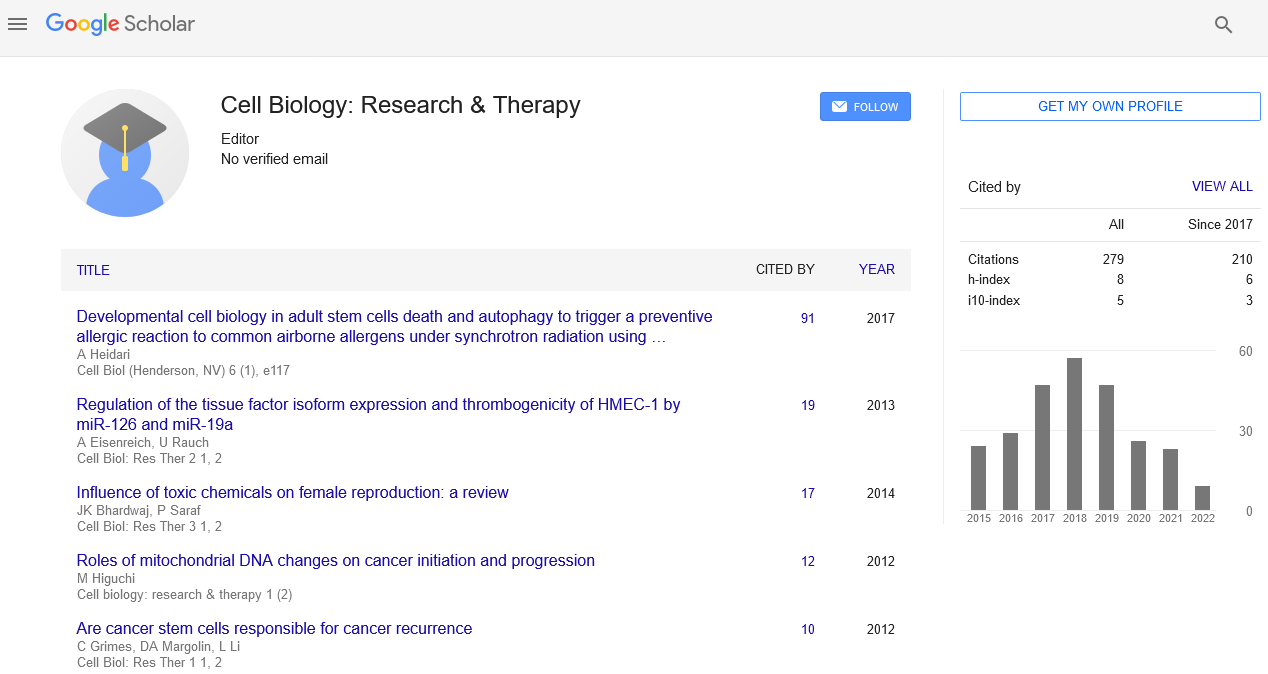Opinion Article, Cell Biol Vol: 12 Issue: 1
The Intersection of RNA Biology and Cancer: Mechanisms and Therapeutic Opportunities
Pauline Steven*
1Department of Microbiology, Vanderbilt University Medical Center, Nashville, United States of America
*Corresponding Author: Pauline Steven
Department of Microbiology, Vanderbilt
University Medical Center, Nashville, United States of America
E-mail: stevenpauline@vum.edu
Received date: 21 February, 2023, Manuscript No. CBRT-23-93180;
Editor assigned date: 23 February, 2023, Pre QC No. CBRT-23-93180(PQ);
Reviewed date: 07 March, 2023, QC No. CBRT-23-93180;
Revised date: 14 March, 2023, Manuscript No. CBRT-23-93180(R);
Published date: 24 March, 2023, DOI: 10.4172/2324-9293.1000170
Citation: Steven P (2023) The Intersection of RNA Biology and Cancer: Mechanisms and Therapeutic Opportunities. Cell Biol 12:1.
Description
RNA biology has become a key area of cancer research over the past few years, with a growing body of evidence highlighting the critical roles played by RNA molecules in cancer development and progression. Advances in RNA sequencing and analysis technologies have allowed researchers to identify specific RNA molecules that are dysregulated in various cancer types. These RNA molecules are involved in key cellular processes such as gene expression, splicing, and translation, making them attractive targets for cancer therapies.
One important area of research in RNA biology and cancer is the role of non-Coding RNAs (ncRNAs) in cancer.ncRNAs are RNA molecules that do not code for proteins, but instead have regulatory roles in gene expression.These include microRNAs (miRNAs), long non-coding RNAs (lncRNAs), and circular RNAs (circRNAs). Dysregulation of of ncRNAs has been implicated in cancer development and progession in various ways.
For example, miRNAs are short RNA molecules that bind to messenger RNAs (mRNAs) and prevent their translation into proteins. Dysregulation of miRNAs has been implicated in cancer development and progression, with some miRNAs acting as tumor suppressors and others as oncogenes. For instance, miR-21 is often upregulated in many cancer types, promoting cancer cell proliferation, migration, and invasion.
Similarly, lncRNAs have been shown to play critical roles in cancer development and progression by regulating various cellular processes such as chromatin modification, transcription, and translation. Dysregulation of lncRNAs has been linked to many cancer types, including breast cancer, lung cancer, and liver cancer. For instance, the lncRNA HOTAIR has been shown to promote cancer cell proliferation, invasion, and metastasis in breast cancer.
Another area of research in RNA biology and cancer is the role of RNA editing in cancer. RNA editing is a process in which RNA molecules are chemically modified after they are transcribed from DNA. This process can alter the function of RNA molecules, with some RNA editing events being dysregulated in cancer. For example, Adenosine-to-Inosine (A-to-I) RNA editing is often dysregulated in cancer, leading to altered gene expression patterns and cancer cell proliferation.
In addition to these areas of research, there is also growing interest in the use of RNA-based therapies for cancer. RNA-based therapies include RNA Interference (RNAi) and Anti-Sense Aligonucleotides (ASOs), both of which can be used to target specific RNA molecules involved in cancer development and progression. RNAi involves the use of small RNA molecules to silence specific genes, while ASOs are short DNA or RNA molecules that can bind to specific RNA molecules and prevent their function. Both RNAi and ASOs have shown promise as cancer therapies in preclinical studies, with several clinical trials currently underway.
Conclusion
In conclusion, the intersection of RNA biology and cancer is a rapidly growing area of research, with many exciting developments in recent years. The dysregulation of specific RNA molecules, including ncRNAs and RNA editing events, has been implicated in cancer development and progression, making these RNA molecules attractive targets for cancer therapies. Additionally, RNA-based therapies such as RNAi and ASOs have shown promise as cancer treatments in preclinical studies, highlighting the potential of RNA-based approaches for cancer therapy. Further research in this area is likely to yield new insights into the molecular mechanisms of cancer and new therapeutic opportunities for cancer patients.
 Spanish
Spanish  Chinese
Chinese  Russian
Russian  German
German  French
French  Japanese
Japanese  Portuguese
Portuguese  Hindi
Hindi 